Film Name: 不虚此行 / All Ears
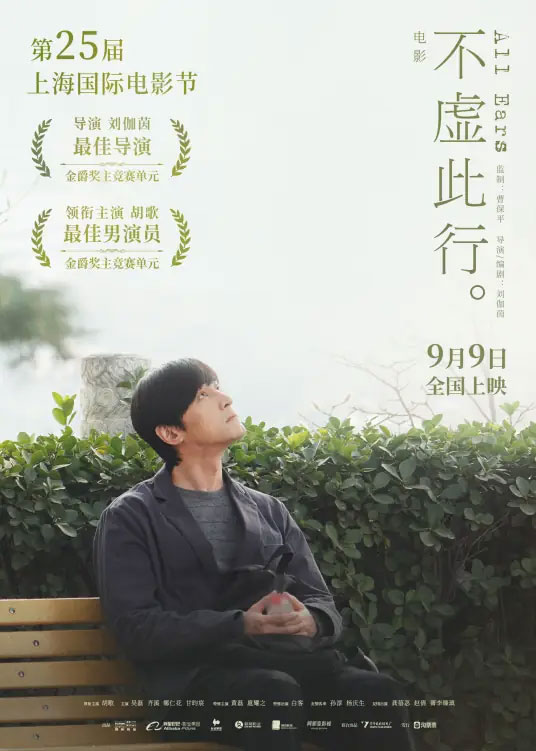
01
What strikes me about 《All Ears》 is its simplicity.
Many people describe this film as “restrained”, but I think “simple” would be more accurate. It’s like a fragment stripped from the matrix of life, with no heart-stopping beginning or dramatic ending; it’s like a collection of countless small, accidental events, which come and go suddenly, not always with answers, and not always without a do-over.
This is a film that bows down to life, so it never dares to use life as material for editing or as an argument for expression; instead, it can only pin life like a specimen on a time scale.
It is for this reason that the camera in this film has almost the only angle left, which is flat, still, silent and stagnant, as if this is the only way that the scent of life will not be blown away.
02
This simplicity is also reflected in the subject matter. 《All Ears》 is a film about creation.
In recent years, there have been many films of this kind. In a way, it also reflects the lack of creative resources at the moment, which makes creators have to work more from their own experience – so that it is not only familiar, but also safe.
In addition, these films are also characterised by a tendency to be evasive. Either they use the difficulty of creation to complain about life, or they use “creation” as a special way to gain insight into life, in order to make metaphysical reflections on real problems.
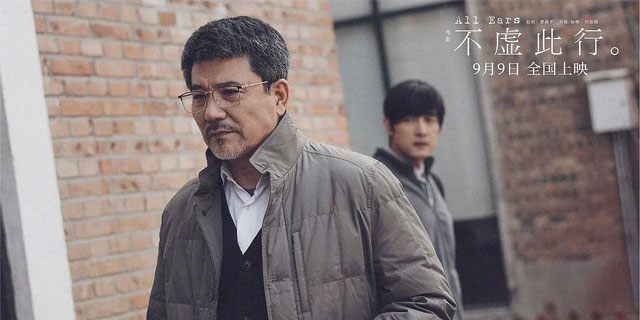
In contrast, 《All Ears》 is much purer. On the surface, it talks about life and death in addition to creativity. It seems to be exploring creativity through a down-on-his-luck screenwriter who writes eulogies, and through his experience of constantly brushing up against death and meeting the living, while feeling life and death.
But in reality, life and death are not that important to this film. It only exists as an opportunity for encounter and an atmosphere of impermanence. The director does not give a single shot of the dead in the whole film, and she carefully excludes death from the viewer’s field of vision, so as to tell us that this is not a dirge for the dead, but a song for the living.
For death is not special to life. It is nothing more than an event that everyone is bound to experience. And compared with the certainty of death, the unexpected life is more worth writing about.
So the film’s theme can be further narrowed down, and it is about the matter of “creation”. Specifically, it explores the questions of who to create for and why to create.
03
As someone who writes, I was particularly touched by this theme.
In the film, Hu Ge plays Wen Shan, who, because he cannot adapt to the demands of the screenwriting industry, switches to writing eulogies for others. He is undoubtedly caught in a dilemma, but this dilemma is not at all intense or tough, but rather like a frog being boiled in warm water, it wears down one’s will.
The film keeps emphasising the idea of the “ordinary man”, and what’s really ordinary is that even his predicament is so ordinary, so unassuming. He doesn’t have a broken world to save, he doesn’t have a great career to break into, he is just caught by a small obstacle in his life.
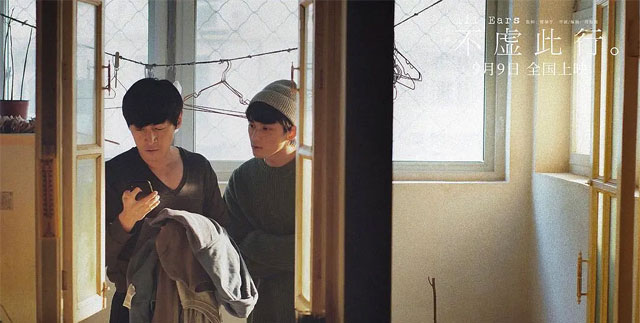
Like avoiding death, the director avoids Wen Shan’s encounters in the screenwriting industry, those bad moments when he was given a hard time by the A-side and verbally abused by the clients. She takes this opportunity to tell everyone that this is not a creator’s self-pity, not a lament about the lack of talent, and not a diatribe against the chaos of the industry. It’s just a person’s internal crisis, a creator who has lost the urge to create.
Therefore, when we look at the state of Wen Shan in the film, he is not in a state of despondency as he is suppressed by the industry and dragged down by his career, but he is always in a state of despondency and worry. What he is worried about is that he obviously has an object he wants to create, but he is unable to put pen to paper. The unfinished work is both like a boulder pressing down on him, slowing down his every movement, and like a black hole, always sucking away part of his attention, causing him to lose his concentration from time to time.
In the midst of this, Hu adopts an almost zero-degree acting style, using hunching, slow walking, lax gazes, hesitant expressions, and slow half-beat movements to show Wenshan’s self-absorption and subconscious self-loathing.
Looking at Wenshin’s change of career from this point of view, it is actually more like a long delay. He wants to offset the loss of control of his creative impotence with something he can control. At the same time, this thing has naturally become a means of earning a living, but not for making money, or else it would not be possible to explain why he has always strictly controlled the frequency of orders, and actively reduced the efficiency of earning money. He wanted to give himself time to observe life and face the real creation.
Only, to his surprise, in this long delay, salvation came unexpectedly.
04
In the course of helping to write a eulogy, Wenshin meets a lot of people.
Usually such a narrative structure uses the protagonist as a tour guide; in other words, the protagonist doesn’t matter; what matters is that he is used to bring out the other characters. But 《All Ears》 is just the opposite; those characters who appear by chance, their expressions, words, actions, and attitudes all act on Wenshan in the end to a greater or lesser extent, causing him to finally regroup and pick up a pen and paper.
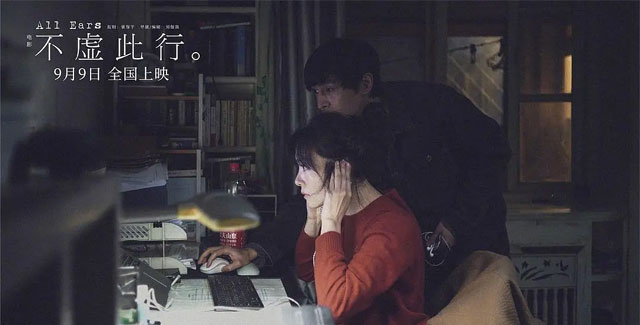
This is another subtraction made by the director. She makes the beings retreat to the back view, leaving the foreground always to Wen Shan alone.
As for how this chemistry between people actually happens, usually films will give a full explanation, with the director carefully arranging each character to take on different dramatic roles, and finally piecing together a complete chain of cause and effect, telling the audience that this is how the protagonist is cured.
But 《All Ears》 doesn’t do that, it deliberately blurs the clear cause and effect relationship, and treats the relationship between people and their influence as a subtle process.
The people who appear in the film, they all face the grief of the loss of a close friend or relative, and death is like a needle that pierces through all defences, forcing them to reveal their true feelings.
Because of the death of their elder brother, the siblings of the Wan family have no choice but to get together again to face that heavy and soft affection again; Mr Wang, who is busy with his work and has little time to get together with his father, is full of regrets but has no time to grieve because he still has a son to take care of, as he still has to be a qualified father after losing his son’s identity; Auntie Fong, an internet redditor of the Cancer Circle, is still laughing and smiling in the face of life and death, and is using the most fashionable way of the moment to She is using the most fashionable way of the moment to dissolve the oldest proposition ……
Among these, the characters that impressed me the most were Jin Sui and the mysterious orangutan keeper.
If Wen Shan is an intruder in everyone’s life, Jin Sui, played by Qi Xi, is Wen Shan’s intruder. This big-hearted, straight-talking girl breaks into Wen Shan’s house, sits in the swivel chair where he writes, and occupies his computer. This is no doubt an “offence” to a writer, but it is precisely this offence, this kind of uninhibited questioning, that makes Wen Shan inescapable, and must face the cause of his inner illness.
The orangutan keeper’s role is small, and he only makes a few hasty appearances, but he is extremely important. He stays in a corner no one knows about every day, doing his job diligently. He does this not only out of professional necessity, but also because he enjoys the “company of animals” itself.

To say that the appearance of these people is the biggest revelation to Winsome Goodness. It’s not really about what they’ve done or who they are, but that they are real enough.
That’s really what the film is trying to say the most, and what it’s actually saying is that reaching out, coming face-to-face, and connecting with real people is the most crucial step in itself, and it’s far more important than all that added meaning.
Considering that this is a film about life during an epidemic, we might feel more strongly about that.
05
Finally, Wen Shan sat down in front of his computer once again and picked up his long-delayed work. He typed the first line. At that moment, a small, imperceptible smile appeared on actor Hu Ge’s face, as if he had been petrified for many years and suddenly realised that a nerve inside his body had turned on a long-lost jump.
As a person who writes, I can very well understand how that feels.
The deadliest moment of collapse for a creator is the realisation that he or she is “ordinary”. I’m not a genius, I don’t have an inexhaustible supply of inspiration, and at this point, a blank piece of paper becomes the worst nightmare.
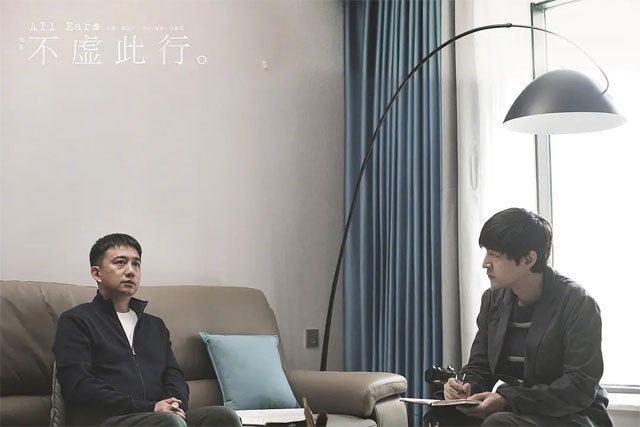
Ordinary” is also a concept that 《All Ears》 plays with all the time. The film is actually about an ordinary dilemma experienced by an ordinary person in an ordinary house.
The solution to this dilemma is equally ordinary. As a writer, one must realise that the ordinary itself is worthy of being written about, and that the folds of life are worthy of being spread out and recorded in detail. There is no need for earth-shattering drama, no need for all-powerful heroes, no need for death-threatening strikes, no need for the splendour of life, the lights …… where there can be only an ordinary protagonist, a mundane life, and a few moments of sudden flickering shimmering light from a not-so-wonderful world.
It is only by affirming the ordinary that the rewards of life are revealed.
I think this is also the simple truth that Wen Shan suddenly understood after encountering so many ordinary people.
Finally, after this long delay, a creator is resurrected.
Please specify:Anime Phone Cases » All Ears 2023 Film Review: One long delay